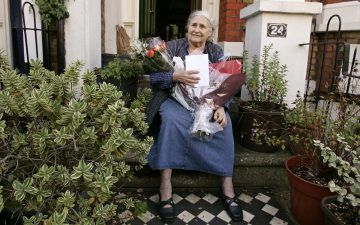Lara Feigel at The New Statesman:
 The landscape of Lessing’s childhood – and her sense of being in exile from it afterwards – remained, I think, the key to her writing in the 40 books that eventually gained her a Nobel Prize. Her experience of the veld was crucial to her politics. She became a communist because she was outraged by the system of racial segregation known as the colour bar, oppressing the black people she heard playing the drums at night outside in the bush while her mother played Chopin on the piano. And the veld was also crucial to her life as a feminist. After roaming freely as a child, sometimes pausing to shoot guinea fowl, she didn’t understand the conventions governing women’s lives in the city. Living in the Southern Rhodesian capital of Salisbury (now Harare), she found the nuclear family unbearably claustrophobic and longed to escape a social world that restricted the independence of women. And so, in 1942, aged 23, she abandoned her marriage, leaving behind two children.
The landscape of Lessing’s childhood – and her sense of being in exile from it afterwards – remained, I think, the key to her writing in the 40 books that eventually gained her a Nobel Prize. Her experience of the veld was crucial to her politics. She became a communist because she was outraged by the system of racial segregation known as the colour bar, oppressing the black people she heard playing the drums at night outside in the bush while her mother played Chopin on the piano. And the veld was also crucial to her life as a feminist. After roaming freely as a child, sometimes pausing to shoot guinea fowl, she didn’t understand the conventions governing women’s lives in the city. Living in the Southern Rhodesian capital of Salisbury (now Harare), she found the nuclear family unbearably claustrophobic and longed to escape a social world that restricted the independence of women. And so, in 1942, aged 23, she abandoned her marriage, leaving behind two children.
Looking back on Lessing now, a hundred years after her birth, it’s the freedom with which she thought and acted for herself that makes her so enticing. This was the freedom to leave her first marriage (“I would have had to live at odds with myself, riven, hating what I was part of, for years”) and then to have a new child with her second husband, Gottfried Lessing, though she knew they were going to split up.
more here.
